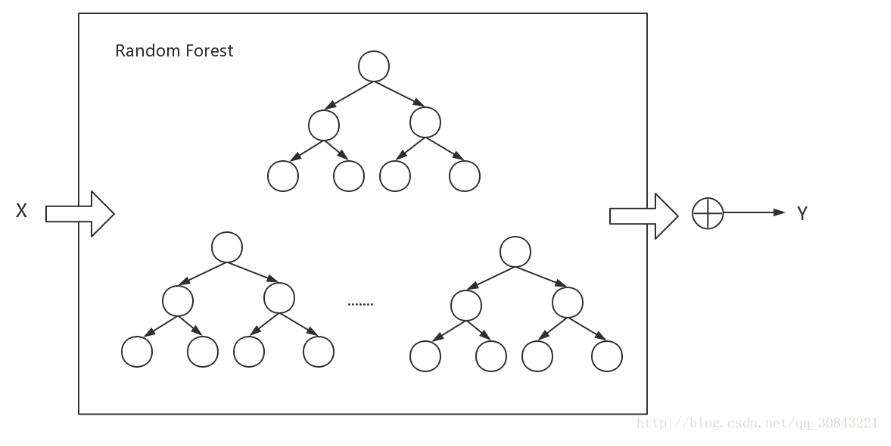前言
最近一段时间都在处理电影领域的数据, 而电影票房预测是电影领域数据建模中的一个重要模块, 所以我们针对电影数据做了票房预测建模.
前期工作
一开始的做法是将这个问题看待成回归的问题, 采用GBDT回归树去做. 训练了不同残差的回归树, 然后做集成学习. 考虑的影响因子分别有电影的类型, 豆瓣评分, 导演的 影响力, 演员的影响力, 电影的出品公司. 不过预测的结果并不是那么理想, 准确率为真实值的0.3+/-区间情况下的80%, 且波动性较大, 不容易解析.
后期的改进
总结之前的失败经验, 主要归纳了以下几点:
1.影响因子不够多, 难以建模
2.票房成绩的区间较大(一百万到10亿不等),分布不均匀, 大多数集中与亿级, 所以不适合采用回归方法解决.
3.数据样本量比较少, 不均匀, 预测百万级的电影较多, 影响预测结果
后期, 我们重新规范了数据的输入格式, 即影响因子, 具体如下:
第一行: 电影名字
第二行: 电影票房(也就是用于预测的, 以万为单位)
第三行: 电影类型
第四行: 片长(以分钟为单位)
第五行:上映时间(按月份)
第六行: 制式( 一般分为2D, 3D, IMAX)
第七行: 制作国家
第八行: 导演影响 (以导演的平均票房成绩为衡量, 以万为单位 )
第九行: 演员影响 ( 以所有演员的平均票房成绩为衡量, 以万为单位 )
第十行:制作公司影响 ( 以所有制作公司的平均票房成绩为衡量, 以万为单位 )
第十一行: 发行公式影响 ( 以所有制作公司的平均票房成绩为衡量,以万为单位 )
收集了05-17年的来自中国,日本,美国,英国的电影, 共1058部电影. 由于处理成为分类问题, 故按将电影票房分为以下等级:

在构建模型之前, 先将数据处理成libsvm格式文件, 然后采用随机森林模型训练.
随机森林由许多的决策树组成, 因为这些决策树的形成采用随机的策略, 每个决策树都随机生成, 相互之间独立.模型最后输出的类别是由每个树输出的类别的众数而定.在构建每个决策树的时候采用的策略是信息熵, 决策树为多元分类决策树.随机森林的流程图如下图所示:

随机森林是采用spark-mllib提供的random forest, 由于超过10亿的电影的数据相对比较少, 为了平衡各数据的分布, 采用了过分抽样的方法, 训练模型的代码如下:
public void predict() throws IOException{
SparkConf conf = new SparkConf().setAppName("SVM").setMaster("local");
conf.set("spark.testing.memory", "2147480000");
SparkContext sc = new SparkContext(conf);
SQLContext sqlContext = new SQLContext(sc);
// Load and parse the data file, converting it to a DataFrame.
DataFrame trainData = sqlContext.read().format("libsvm").load(this.trainFile);
DataFrame testData = sqlContext.read().format("libsvm").load(this.testFile);
// Index labels, adding metadata to the label column.
// Fit on whole dataset to include all labels in index.
StringIndexerModel labelIndexer = new StringIndexer()
.setInputCol("label")
.setOutputCol("indexedLabel")
.fit(trainData);
// Automatically identify categorical features, and index them.
// Set maxCategories so features with > 4 distinct values are treated as continuous.
VectorIndexerModel featureIndexer = new VectorIndexer()
.setInputCol("features")
.setOutputCol("indexedFeatures")
.setMaxCategories(4)
.fit(trainData);
// Split the data into training and test sets (30% held out for testing)
// DataFrame[] splits = trainData.randomSplit(new double[] {0.9, 0.1});
// trainData = splits[0];
// testData = splits[1];
// Train a RandomForest model.
RandomForestClassifier rf = new RandomForestClassifier()
.setLabelCol("indexedLabel")
.setFeaturesCol("indexedFeatures")
.setNumTrees(20);
// Convert indexed labels back to original labels.
IndexToString labelConverter = new IndexToString()
.setInputCol("prediction")
.setOutputCol("predictedLabel")
.setLabels(labelIndexer.labels());
// Chain indexers and forest in a Pipeline
Pipeline pipeline = new Pipeline()
.setStages(new PipelineStage[] {labelIndexer, featureIndexer, rf, labelConverter});
// Train model. This also runs the indexers.
PipelineModel model = pipeline.fit(trainData);
// Make predictions.
DataFrame predictions = model.transform(testData);
// Select example rows to display.
predictions.select("predictedLabel", "label", "features").show(200);
// Select (prediction, true label) and compute test error
MulticlassClassificationEvaluator evaluator = new MulticlassClassificationEvaluator()
.setLabelCol("indexedLabel")
.setPredictionCol("prediction")
.setMetricName("precision");
double accuracy = evaluator.evaluate(predictions);
System.out.println("Test Error = " + (1.0 - accuracy));
RandomForestClassificationModel rfModel = (RandomForestClassificationModel)(model.stages()[2]);
// System.out.println("Learned classification forest model:\n" + rfModel.toDebugString());
DataFrame resultDF = predictions.select("predictedLabel");
JavaRDD<Row> resultRow = resultDF.toJavaRDD();
JavaRDD<String> result = resultRow.map(new Result());
this.resultList = result.collect();
for(String one: resultList){
System.out.println(one);
}
}
下面为其中一个的决策树情况:
Tree 16 (weight 1.0):
If (feature 10 in {0.0})
If (feature 48 <= 110.0)
If (feature 86 <= 13698.87)
If (feature 21 in {0.0})
If (feature 54 in {0.0})
Predict: 0.0
Else (feature 54 not in {0.0})
Predict: 1.0
Else (feature 21 not in {0.0})
Predict: 0.0
Else (feature 86 > 13698.87)
If (feature 21 in {0.0})
If (feature 85 <= 39646.9)
Predict: 2.0
Else (feature 85 > 39646.9)
Predict: 3.0
Else (feature 21 not in {0.0})
Predict: 3.0
Else (feature 48 > 110.0)
If (feature 85 <= 15003.3)
If (feature 9 in {0.0})
If (feature 54 in {0.0})
Predict: 0.0
Else (feature 54 not in {0.0})
Predict: 2.0
Else (feature 9 not in {0.0})
Predict: 2.0
Else (feature 85 > 15003.3)
If (feature 65 in {0.0})
If (feature 85 <= 66065.0)
Predict: 3.0
Else (feature 85 > 66065.0)
Predict: 2.0
Else (feature 65 not in {0.0})
Predict: 3.0
Else (feature 10 not in {0.0})
If (feature 51 in {0.0})
If (feature 85 <= 6958.4)
If (feature 11 in {0.0})
If (feature 50 <= 1.0)
Predict: 1.0
Else (feature 50 > 1.0)
Predict: 0.0
Else (feature 11 not in {0.0})
Predict: 0.0
Else (feature 85 > 6958.4)
If (feature 5 in {0.0})
If (feature 4 in {0.0})
Predict: 3.0
Else (feature 4 not in {0.0})
Predict: 1.0
Else (feature 5 not in {0.0})
Predict: 2.0
Else (feature 51 not in {0.0})
If (feature 48 <= 148.0)
If (feature 0 in {0.0})
If (feature 6 in {0.0})
Predict: 2.0
Else (feature 6 not in {0.0})
Predict: 0.0
Else (feature 0 not in {0.0})
If (feature 50 <= 4.0)
Predict: 2.0
Else (feature 50 > 4.0)
Predict: 3.0
Else (feature 48 > 148.0)
If (feature 9 in {0.0})
If (feature 49 <= 3.0)
Predict: 2.0
Else (feature 49 > 3.0)
Predict: 0.0
Else (feature 9 not in {0.0})
If (feature 36 in {0.0})
Predict: 3.0
Else (feature 36 not in {0.0})
Predict: 2.0
后记
该模型预测的平均准确率为80%, 但相对之前的做法规范了很多, 对结果的解析也更加的合理, 不过如何增强预测的效果, 可以考虑更多的因子, 形如:电影是否有前续;电影网站的口碑指数;预告片的播放量;相关微博的阅读数;百度指数等;
以上就是本文的全部内容,希望对大家的学习有所帮助,也希望大家多多支持自由互联。
